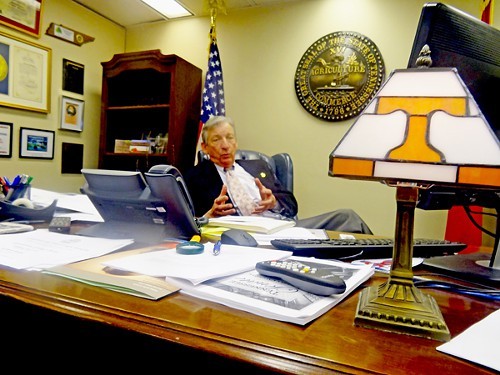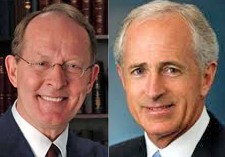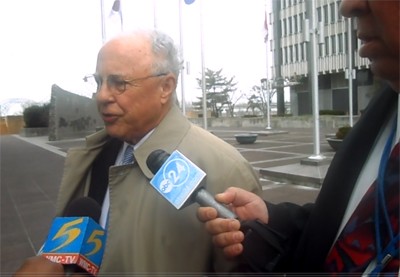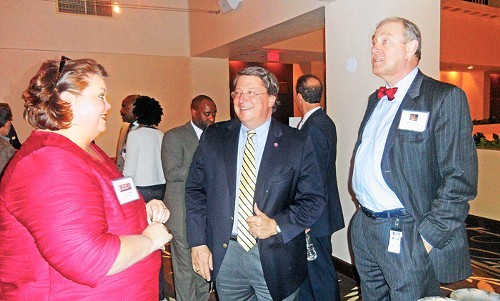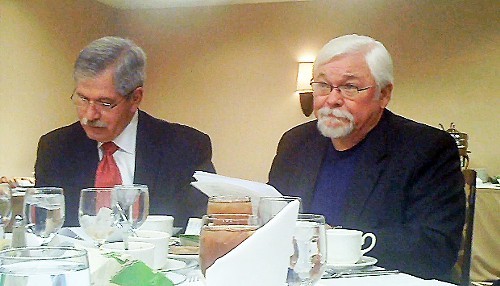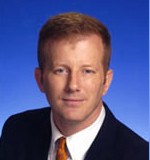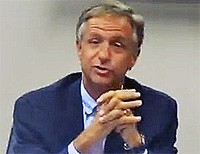NASHVILLE — In the middle of last Wednesday’s first formal meeting of the Shelby County legislative delegation in Nashville, Democratic state representative Antonio Parkinson, who was moderating the meeting, was redirecting somebody’s question about some pro forma matter to the delegation’s newly elected chairman, state senator Reginald Tate.
“Chairman Norris?” he said, in what had to be some kind of Freudian slip.
Tate decided to riff on the error, which had begun to draw modest guffaws from the delegation. “I’m the real Mark Norris,” he said, as if in casual acknowledgment of a long-held secret.
And that set up state representative Joe Towns, a Democrat and African American like Parkinson and Tate but one less inclined than either to work hand-in-glove with the General Assembly’s dominant Republicans, of whom Norris, the GOP’s majority leader in the Senate, was a highly influential one.
Under his breath but audibly to most of those nearby, Towns said, “Y’all look like twins. That’s why I believe in birth control.”
All parts of that exchange were uttered — and taken — lightly, but that is not to say that the back-and-forthing did not betoken some serious issues within the delegation. It did.
Less than a week before, after a dinner meeting of the Germantown Democratic Club (at which he’d been a lively raconteur), Tate was discoursing on his place in the legislature’s political firmament, responding specifically to questions about his seeming coziness with leading Republicans and his estrangement from the current leadership of the ever-shrinking state Democratic Party.
“It just so happens that I’m not dancing to the music,” Tate said. As to his easy and frequent access to GOP leaders like Lieutenant Governor Ron Ramsey, the Senate speaker, the south Shelby County legislator was up front: “If I can’t get you to help me, then I’m going to get somebody else to help me.”
Yes, he conceded, he is friendly with Ramsey, but that’s because “he wants to reach out to the Democratic side.” Besides, said Tate, who had challenged fellow Memphian Jim Kyle, the longtime Senate Democratic leader, for control of the sorely diminished party caucus and lost by a single vote, 4-3, “If I’m not dancing to Kyle’s music, what makes anybody think I’d dance to Ramsey’s music?”
On that latter point, Tate acknowledged voting counter to other Democrats and with local Republicans Norris and state representative Curry Todd on the two Republican legislators’ several bills to pave the way for suburban school independence, but that, he suggested, could result in possible quid pro quo arrangements down the line for the areas he represents.
Tate was talking realpolitik of a fairly basic kind, and, while he may be more active than most Democrats in courting such trade-offs — and certainly more open in discussing them out loud — he is certainly not the only Democrat to seek accommodation with the Republican majority.
It’s a matter of arithmetic, really. Starting with the election of 2008, in which there seemed to be a state backlash against the first Obama presidential candidacy, continuing with the Tea Party wipeout of Democratic seats in 2010, and culminating with another strong Republican showing in 2012, assisted by some artful redistricting by the now dominant GOP, Democrats are barely on the legislative map at all.
They have the aforesaid seven of the state Senate’s 33 members. They have 27 of the 99-member state House of Representatives. The GOP has the governorship, all of the state’s constitutional officers, seven of the nine congressional seats, both U.S. Senate seats, and what would seem to be the same kind of firmly committed loyalty that Democrats used to possess and now can count on in only a very few isolated patches of Tennessee — most notably Shelby County, largely because of its black population; and Davidson County (Nashville), arguably the sole surviving remnant on Planet Earth of the old solid Democratic South.
For Democrats in the Tennessee legislature, the old expression “go along to get along” has very definite relevance.
Even Kyle, a longtime party point man who, by virtue of his leadership post, is one of the official upholders of the Democratic standard, has found it necessary to deviate from strict orthodoxy. After Republican-controlled reapportionment relocated him in a district that was not up for election last year, in effect deleting him from the Senate, he was forced to negotiate with the GOP powers-that-be for inclusion in a district he could run in.
That turned out to be District 30, which already had a Democratic incumbent, Beverly Marrero, who was not exactly thrilled to find her party leader opposing her reelection and who would lose that match. And, rather than opposing outright certain GOP agenda items — like one for state education vouchers, which is backed by the governor and currently picking up steam — Kyle indicated last week that his strategy will be to seek modifications.
In his State of the State message to the newly reconvened General Assembly on January 28th, Governor Bill Haslam issued what sounded like a sincere nod to bipartisanship:
“I believe we have to begin this evening by addressing the elephant in the room — or I guess I should say the elephants in the room. There are a lot of expectations and preconceived notions about how our Republican supermajority is going to govern. … As we go through this legislative session, I ask everyone in this chamber this evening to keep in mind what Senator [Howard] Baker said: ‘The other fellow might be right.’ Tennesseans don’t want us to be like Washington. They don’t want continuous conflict. They do want principled problem solving.”
That was reassuring, coming from a governor who, in contemporary terms, has to be considered a moderate (though the genial Pilot Oil scion and former Knoxville mayor, like all other Republicans on the planet, shies away from such a term as the kiss of death, insisting on being called a “conservative”).
The difference between a Haslam and an archconservative like Ramsey (who finished third in the 2010 Republican primary behind Haslam and then Chattanooga congressman Zach Wamp) is basically one of degree — but the degrees count for much.
In 2011, when he laid out Phase One of the educational-reform package that he clearly intends to be a major part of his legacy, for example, the newly elected Haslam focused on such issues as merit pay for teachers, tenure reform, and expansion of charter schools.
Revocation of teachers’ rights to collectively bargain was never part of his agenda, but it was part of Ramsey’s, who declined to accept the modest tweaks proposed by Haslam (and House speaker Beth Harwell of Nashville, for that matter) and constructed a solid front for abolition in the Senate.
In the end, Haslam gave way on that issue, as he did on several others that first year of his tenure. Since then, he has strived, with mixed success, to hold his own with Ramsey, and the two — like partners to an arranged marriage — make a conscious, and not always successful, effort to stay on the same page.
The realities are that legislative debate for the foreseeable future in Tennessee is likely to be a matter of compromise between Republican factions, with Democrats, confronted with GOP supermajorities in both House and Senate, hoping at best to impact such few borderline votes as may occur.
Here are some of the major issues known to be coming in the 2013 session of the General Assembly:
The voucher bill: What the governor proposes is a modest pilot program, beginning with a maximum of 5,000 students, all of whom must be members of households below the official poverty line and currently be attending schools performing in the lowest 5 percent of Tennessee schools, according to standardized tests.
To critics who maintain such bills will undermine public education and strip already struggling schools of per-pupil funding, Haslam noted in his State of the State address that he is funneling an additional $57 million into the problem institutions, all of which seem destined for the fledgling state-managed Achievement School District created under Haslam’s reform package.
State senator Brian Kelsey (R-Germantown), who introduced the first voucher bill two years ago, more or less along the lines Haslam is proposing now, had floated new proposals involving wider scope and higher subsidies but seems content for the moment with the Haslam bill. Formally sponsored by Norris and House majority leader Gerald McCormick of Chattanooga, it envisions some 20,000 students within three years.
Medicaid expansion: As originally enacted, President Obama’s Affordable Care Act required states to expand Medicaid coverage (Tennessee’s version is TennCare) to individuals earning up to 133 percent of the federal poverty level. The federal government would fully fund the increased costs through 2015, after which states would begin to pick up the slack, incurring a maximum of 10 percent liability for the new expenses in 2022.
With expansion now optional as a result of last summer’s U.S. Supreme Court decision finding “Obamacare” constitutional, debate rages in every state with a conservative majority, and that definitely includes Tennessee. Here is another instance in which the inclinations of Haslam and an assortment of supportive Republicans and Democrats favoring expansion may be thwarted by Ramsey and ultraconservative GOP legislators.
It is generally believed that the governor, earlier on, had been willing to have Tennessee avail itself of the option to form its own medical exchange under Obamacare, but that stout opposition from his right wing backed him off. That pattern seems to be repeating itself on the issue of Medicaid expansion, which the state’s hospital administrators have lobbied for. Haslam has indicated a willingness to consider participating, but two bills — one by Kelsey, which already has 16 of the 33 senators as sponsor — have been introduced to prohibit any expansion, and Ramsey has said flatly (in what may actually be a concession to Haslam) that the issue won’t be dealt with this year.
And that’s probably the case.
Workers’ compensation: Given that the once semigenerous provisions of Tennessee’s workers’ compensation laws were already weakened by bills supported by Democratic governor Phil Bredesen less than a decade ago, it’s a slam-dunk proposition that they will undergo major surgery in the current legislative session.
Here’s a case in which Haslam himself has proposed to wield the scalpel. The most important provision of a measure he announced in his State of the State message is the establishment of a new state bureaucracy that would adjudicate all injury claims and other job-related disabilities which once went directly into litigation and, under the proposed law, would seriously limit the potential grounds for judicial appeal.
Another portion of the Haslam bill would increase the burden of proof on a claimant.
There are doubtless union representatives and trial lawyers who will try to lobby against the bill, but the day in which star lobbyists like John Summers could retard such legislation are now in the past. For better or for worse, making Tennessee more “business-friendly” is now the order of the day, and on this point there is no quarrel between Republican factions.
Guns in parking lots: One bill which famously did divide the GOP in the 2012 legislative session would have further expanded the prevalence of guns in Tennessee even more than had been the case in the NRA-mentored sessions of 2011 and 2012.
Allowing guns in bars and parks was a fairly easy matter for the firearms lobby, notoriously generous (or punitive) with financial and organizational support during political campaigns. But in 2012, a proposal to allow guns in parked cars on business parking lots put the rank-and-filers, including numerous members of the Tea Party class of 2010, in serious conflict with business-minded Republicans, including the governor and the party’s legislative leadership — not to mention the state’s major corporate interests, such as FedEx of Memphis and Volkswagen of Chattanooga.
It was a battle between property rights and gun rights, and, lo and behold, guess who won? The bill was bottled up in committee and held off the floor, and Representative Debra Maggart of Hendersonville, the GOP caucus leader in the House, later paid a penalty, losing her seat in a 2012 primary race to an opponent heavily supported by the NRA and the Tennessee Firearms Association, whose executive director called for Maggart to be “crucified” as an object lesson.
That experience makes it likely that some reprise of the bill will get a fairly attentive hearing in 2013. And a compromise measure seems to be taking shape that would allow permit holders to have the guns concealed in locked cars on business lots, provided that the businesses could keep a record of their permits on file.
Charter school legislation: This one — at least in its full dimension — is the subject of mystery and intrigue on the part of Shelby County’s suburban interests and the legislators who represent them. They seek some legally and politically acceptable substitute for the municipal-schools legislation struck down last year by U.S. district judge Hardy Mays.
What seems to be developing is a proposal for a state authorizer empowered, after an appeals process, to overrule local school boards that might choose to reject this or that charter school application. That much is known, and it’s consistent with the known predilection of Governor Haslam and his Education Department for blowing out the number of charter schools.
The hard part for the suburbanites and their surrogates — Norris and Todd — will be to fashion some schema that would allow large-scale charter school networks to be formed and simultaneously pass muster not only with the courts but, almost as difficult, with legislators, of both parties across the breadth and depth of Tennessee, who don’t want their school boards monkeyed with.
It is the requirement in state law that legislation affecting only a single county be approved by the legislative body of that county (in this case, the wholly resistant Shelby County Commission), which caused a breakdown in Republican Party solidarity last year, forced principal architect Norris to disguise a private bill as a public one, and got an ultimate turndown from Judge Mays.
It remains to be seen if this water can be made into wine.
Wine in grocery stores: Speaking of which, both speakers are now lined up behind the perennial effort to allow wine to be sold in grocery stores. What makes such a bill possible this time around is the requirement in the new version for referenda in those counties that want such privileges.
And there will be more — including as many novelty measures as the inimitable Stacey Campfield of Knoxville (now a state senator) can dream up. He’s already thought up a new version of last year’s discredited and deflected “Don’t Say Gay” bill. This one would force school counselors to identify likely gay students and expose them to their parents. And there’s Campfield’s bill to take away welfare payments from families whose school-agers are screwing up at school.
The shame of it is that Campfield, who got himself a billet on the Senate Education Committee to wreak this mischief, is capable of applying himself to better ends, as he indicated with some acute questioning in committee of the principals involved in state-subsidized virtual (i.e., online) education. This would-be innovation, authorized in the giddy 2011 session, seems to have flunked out due to its poor student scores.
Haslam has called for limiting its enrollment, and legislators from both parties have threatened it with extinction.
